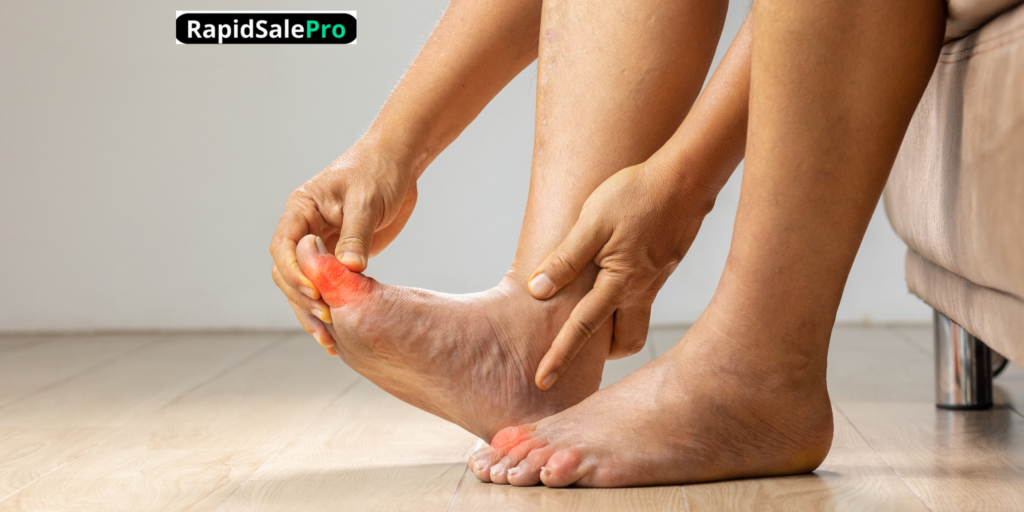Introduction
Gout Solution Review: Are you seeking relief from the intense pain and discomfort caused by gout? Join us in exploring the effectiveness of Gout Solution, a remedy acclaimed for its potential to alleviate symptoms. In this review, we delve into the causes of gout, discuss natural remedies, and provide practical tips for managing this form of inflammatory arthritis.
Find it out with RapidSalePro right now!
⏩See more at: “HEALTH & FITNESS“
Understanding Gout: Causes and Symptoms
Gout, characterized by intense pain and inflammation in joints, particularly toes, ankles, and knees, results from the body's excessive production of uric acid. This guide comprehensively examines the causes of gout and outlines symptoms such as joint pain, limited mobility, and recurrent attacks.

Gout Solution Review: Diagnosis and Medical Treatment
Diagnostic Procedures
To diagnose gout, doctors employ a combination of symptoms, physical examination, and laboratory tests, including joint fluid tests, blood tests, X-ray imaging, ultrasound, and DECT scans.
Medications for Gout Attacks
During acute gout flares, various medications, including NSAIDs, colchicine, and corticosteroids, are commonly prescribed to alleviate pain and reduce inflammation.
Medications to Prevent Gout Complications
For individuals prone to frequent attacks or with complications, medications such as allopurinol and febuxostat are prescribed to lower uric acid levels and prevent future flares.
Lifestyle and Home Remedies for Gout
In addition to medications, adopting specific lifestyle changes and home remedies can significantly contribute to managing gout and reducing the risk of flare-ups. Practical tips include staying hydrated, applying ice to affected joints, managing stress, elevating affected joints, maintaining a balanced diet, and considering natural remedies like lemon water.

Top 10 Gout Solution FAQs
- What is gout?
- Gout is a type of inflammatory arthritis causing sudden and severe joint pain.
- What causes gout?
- Gout is caused by a buildup of uric acid in the blood from the breakdown of purines.
- What are the symptoms of gout?
- Symptoms include severe joint pain, swelling, redness, tenderness, stiffness, fever, and fatigue.
- How is gout diagnosed?
- Diagnosis involves a medical history review, symptoms assessment, physical examination, blood test, and joint aspiration.
- How is gout treated?
- Treatment aims to relieve pain and inflammation during attacks and prevent future episodes, involving medications and lifestyle changes.
- What are the risk factors for gout?
- Risk factors include family history, obesity, purine-rich diet, hypertension, high cholesterol, diabetes, and certain medications.
- How can I prevent gout attacks?
- Prevention involves maintaining a healthy weight, low-purine diet, limited alcohol intake, hydration, and managing related health conditions.
- What is the prognosis for gout?
- Gout is a lifelong condition manageable with medication and lifestyle changes, allowing a normal, healthy life.
- Are there any natural remedies for gout?
- Natural remedies like cherries, celery seed extract, ginger, apple cider vinegar, and turmeric may help, but consultation with a doctor is essential.
- When should I see a doctor for gout?
- Seek medical attention for gout symptoms, especially with a family history or risk factors, to prevent complications and joint damage.
In Conclusion
Effectively managing gout involves a combination of medication, lifestyle modifications, and home remedies. By understanding its causes and symptoms, individuals can proactively prevent flare-ups and minimize the impact of this chronic condition. It's crucial to collaborate closely with healthcare providers to develop a tailored treatment plan addressing individual needs and reducing the risk of complications. With the right approach, individuals with gout can lead fulfilling lives.

